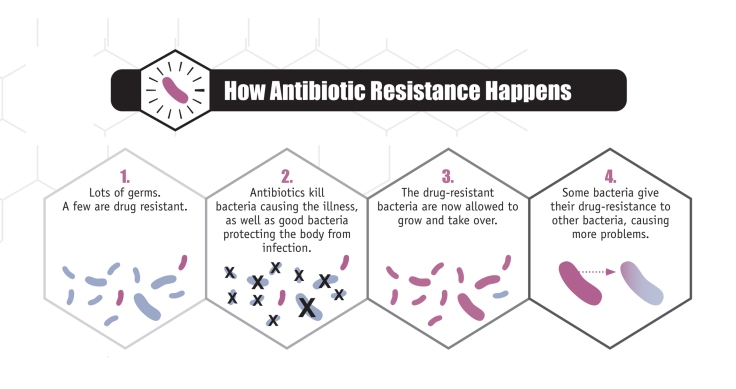I recently read a blog post on ‘Nature jobs’ about science communication and the importance of tailoring your message to the audience you’re trying reach. The post referred to a study commissioned by the Wellcome Trust which questioned the general public on the problem of antibiotic resistance. Rather worryingly the study revealed that there are numerous misconceptions about what antibiotic resistance is and what it’s caused by:
The Wellcome Trust recently commissioned a commercial market research company to ask what the general public thinks about antibiotics and the problem of resistance, in the hope that understanding the audience better could improve their communications. They surveyed people from across age brackets, education levels and socioeconomic statuses. The study revealed that the term commonly used by scientists to describe this phenomenon – antimicrobial resistance (AMR) – was meaningless to the wider public. One common misconception was that our own bodies, not the bacteria, are becoming resistant to the drugs. In addition, the analysis found that the problem holds no gravitas with those interviewed.
This is possibly one of the most worrying things I’ve read in a long time but unfortunately it’s not the first time that a lack of general understanding about antibiotics has come to my attention. Last month whilst sat in the hairdressers, the lady next to me mentioned how she thought she was coming down with a cold. As the conversation pursued, I had to try and hide my chagrin as her hairstylist explained how she too was feeling a bit under the weather and so she had taken some antibiotics that she had saved from a previous chest infection.
I guarantee that anybody with a science background was visibly cringing whilst reading the previous sentence. There are so many things wrong with that comment that it’s hard to know where to begin but for me, the worst is that we’ve obviously failed in communicating the importance of the correct use of antibiotics.
Antibiotics are drugs that are used to treat bacterial infections. As such they are completely ineffective against any illnesses caused by a virus. Some common examples of viral infections include the common cold, the flu and most coughs or sore throats. Often when your doctor refuses to give you antibiotics, it’s because they suspect you have a viral infection as opposed to a bacterial one and so antibiotics will not cure you.
One of the most important things about taking antibiotics is to complete the course! Even if you feel better after a few days, it’s vital that you continue to take all of your medication. Over prescription and incorrect use of antibiotics encourages the rise of bacteria which are resistant to the antibiotic. This could become a major problem in the future making simple infections, like some E. coli or Streptococcal infections, life threatening.

Finally, you should never take an antibiotic which hasn’t been prescribed to you for that specific illness. Some antibiotics react unpredictably with other medications or alcohol and some aren’t suitable if you’re pregnant or breastfeeding. It’s important to read the information leaflet that comes with your antibiotics and discuss any concerns about their use with your GP.
My reaction to the stylist’s words was clearly more obvious than I intended and after asking why I looked so uncomfortable, I politely explained to both her and her client why you should never ‘save’ antibiotics and why you should always finish the course. Much to my concern, they genuinely had no idea about these simple facts surrounding the use of antibiotics and asked me why they’d never been told these before. Now I had previously thought that this was common knowledge and something that both GPs and the media had made abundantly clear but evidently that is not the case. Perhaps as someone who understands the gravity of the antibiotic resistance, the message was more pertinent to me than those who need it most and we aren’t doing enough to raise the awareness of the general public.
Next week I intend to publish a post delving further into antibiotics, their use and the problem of antibiotic resistance but in the mean time you can read more about these topics on the NHS Choices website. I created this post today as I thought that these misconceptions surrounding antibiotics were an issue that needed highlighting immediately. Clearly scientists need to make more of an effort to reach out and make problems such as antibiotic resistance more understandable and relatable to normal, everyday people.


I can’t disagree that some effort on the part of scientists would be welcome, but isn’t the doctor the most important person here? I have no science education, but I’m a bit of a science nerd so I do understand the resistance problem. However, for a doctor to prescribe a medication and not tell the patient how to take that medication just seems wrong. Have I been blessed in my life by having unusually wonderful doctors who explain things?
LikeLiked by 1 person
See I’m like you, I’ve never had a doctor prescribe me antibiotics without telling me to take the entire course but perhaps that message isn’t getting relayed to everybody. Or perhaps the message isn’t emphasised enough. Has your doctor ever explained why you need to take the entire course of antibiotics? If we could get across the reason and the gravity of the problem, maybe the message would be more effective.
LikeLiked by 1 person
Now you’re testing my memory! I believe it has something to do with how long it takes the antibiotic to build up strength and then a while longer to do it’s job. It’s been awhile since I heard that part.
LikeLike
Sorry for putting you on the spot! I didn’t mean to test your knowledge, I was simply wondering whether people would take the advice about completing the whole course of antibiotics more seriously if they knew the reason why. My doctor has always told me to take all of them but never told why that is important. Do you think that would help?
LikeLike
It matters to me, but I am science-minded. If someone is uninterested in the science behind things, I’m not sure it would make a difference. On the other hand, I believe the effort should be made. I think it will matter to enough people that it’s worth the effort. Doctors may be the only scientists some people will ever come in contact with. I know their time is limited, but I think any information they pass on would, overall, be worth the effort.
LikeLiked by 1 person
That is a very good point. For many people, their local doctor is the only ‘scientist’ they’ll ever really meet. I’ve never thought about that before.
LikeLiked by 1 person
Now I’m thinking I should mention that to my doctor next time I go in. 🙂
LikeLiked by 1 person